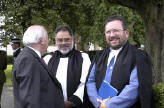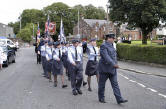|
|||||||||||||
|
Everyone taking part assembled at Greenside instead of the Railway Station due to the work being done on the footbridge. Just before 2pm Colonel John Dalrymple Hamilton OBE TD DL was invited to inspect the Colour Party and Alex Davidson brought the Colour Party to attention to meet the Colonel. Accompanied by Pipe Major Gavin Nicol, the Colours then marched to the front of the parade to take up position behind Maybole Pipe Band for the parade to Memorial Park via Ladyland Road and Kirkoswald Road. Also in the parade were Commander John T Lorimer, DSO, Major John C K Young, Representatives of Ayrshire Area RBLS, Rev Dave Whiteman, Rev David Jone, Superintendent Bruce Kennedy and Inspector Stewart Gaudin of Strathclyde Police, Provost Gordon Mc Kenzie and Councillors John McDowall and Ian Fitzsimmons of South Ayrshire Council, David Kiltie, chairman of Maybole Community Council, British Legion Branches including Maybole Ladies Branch, Representatives of Hollybush House, Ex Servicemen, 1371 (Girvan) Squadron Air Training Corps, Maybole Community Council, Maybole Community Association, Maybole Brownies, Maybole Boys Brigade, Apprentice Boys of Derry, and pupils of Carrick Academy. On entering the car park at the swimming pool the pipe band marched along the front of the pavilion, turned and halted in line with the head of the parade to form the left flank of a hollow square and the remainder of the parade completed the rest of the hollow square around the VIPs. Drummers from the pipe band then stacked their drums and the clergy took up position behind them. Maybole Branch Chaplain, Rev David Whiteman BD then accepted the colours from standard bearers Robert Malone and William Milligan and placed them over the drums. Welcoming everyone to the Drumhead Service, Rev Dave Whiteman said, “We are 60 years on from the cessation of hostilities and the end of World War II and we gather today in our service of thanksgiving. Usually at our services of remembrance we hear Binyon’s Lines and the Last Post but today they will be omitted because this is not a Remembrance service but a thanksgiving service. Today we come to especially give thanks for all who were involved in the war on the Home Front.” He then began the service with a prayer saying, “Let us pray. Our gracious and eternal God we give you thanks for the world you have created. We praise you for your great goodness to your people in sending Jesus Christ to be the Saviour of those who trust in him. Today especially as we celebrate the 60th anniversary of the end of the Second World War we thank you for all who courageously served our country in time of war. We praise you for the graces of strength and endurance given to our people in those dark days of danger and sorrow. We gather today to remember and give thanks for all who were involved in the Home Front, for the great virtues of strength and fortitude and courage given to your people. We give you thanks for all who laid down their lives for our sake, make us worthy of their sacrifice, help us to strive for peace, make us loyal to each other and above all to you our God and may the example given to us by those who came through those dark years be an inspiration to us all. Amen.” Psalm 121 was then read by Rev David Jones. In his talk following the reading Rev Whiteman said, “Today we come in thanksgiving to remember a time which was a time of total war. 747 men were conscripted from Maybole and 29 of those did not return - we will remember them. But today I want to concentrate on others who served our nation so faithfully. There was of course the 4th arm -- the Merchant Navy who this nation depended on for supplies. My uncle was a captain in the Merchant Navy and he was torpedoed eight times on the Atlantic crossing, many, many merchantmen gave there lives. We remember today the ATS, the WRENS and the WAAFs, and the female ferry pilots who moved planes around the country. Then there was the reserved occupation, and we remember the Bevan boys conscripted into working in the coal mines. The emergency services played their part, the auxiliary fire service, the special constabulary with many retired police officers called up to form the war reserve police. Then there was the Home Guard, a big unit in Maybole and I'm told they would have given the enemy a run for there money. There was the Royal Observer Corps, the aircraft spotters, the fire watchers, the ARP wardens, and there was a special reserve unit set up to deal with rescue and first aid in times of air raids. Then there were the essential war workers, the land army, ambulance drivers, fire brigade, train drivers, communications workers keeping the telephones and post going and the nurses and doctors. The munitions factory at Girvan was a dangerous place to work, folk I’m told developed yellow skin after working there. The WRVS was formed in the war years, and the Red Cross played their part with folk making what was known as comfort parcels. The point I am making today is this, everyone was involved in the war effort, even the youth. The Guides, Boys Brigade and Scouts had litter drives, collecting rubber one week, metal the next week, paper the next week and so on. Children were used as runners to carry messages between look out posts. and some were decorated for there bravery. The schools were constantly raising funds for the war effort, the Becephalus fund which sent money to Russia to help them replace the horses killed in the war, the Spitfire Fund, the halfpenny ship fund. Remember the ships on the halfpenny, this went to the navy. Every school in Britain knitted squares to make blankets for the troops; there was Dig for Victory when school playing fields were dig up to plant vegetables; it was the era of the allotment and rationing, and the kids went to work in the farms picking tatties. And of course the evacuees taken from there homes to safer environments. Troops were billeted in the shoe factory in Maybole and of course many will remember the soldiers in the prisoner of war camp here. I was born 15 years after the war so I do not remember it and I cannot imagine it. But I’ve heard that in all the anguish and heartache of war there was a spirit born. Everyone was involved in the war effort, it was a time when everyone helped everyone else. It was a time of total war and everyone was involved in some way. Today we come to thank God for them all, and especially today we come to say ‘Thank you’ to them all.” During the singing of the last hymn the Maybole standard bearers moved to the front of the drums to receive their colours back before the Benediction and the National Anthem. After the drummers had taken back their drums the parade left the park and made its way to the Greenside this time via Kirkoswld Road, Whitehall, and past the Town Hall where the salute was taken by Colonel Dalrymple Hamilton. The parade continued into School Vennel and terminated at the Greenside. Afterwards there was a light buffet in the Town Hall where David Kiltie thanked everyone who had taken part in making the day so successful and Mrs Georgina Cairns, chair of Ayrshire Area RBLS, also thanked the organisers and everyone who had contributed to a wonderful event. |
|||||||||||||
































